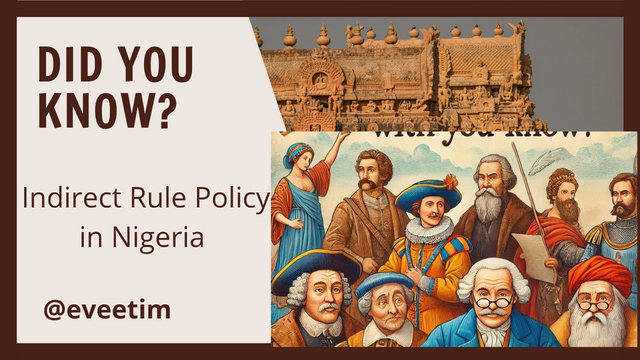Did You Know?
Hi friends, last two weeks Wednesday marked 59 years since the first coup d'état took place in Nigeria. I had to divert from colonial rule in Nigeria to write about an event which is very significant in the history of our great nation Nigeria. From there, we discussed about the reasons for the military interventions in Africa and indeed, Nigeria in particular.
Today, I want to continue with the history of colonial rule in the area known as Nigeria.
A little reminder about our history so far, remember the British took full ownership over the area known as Nigeria today in 1900, divided it into two protectorates.
In 1914, the two protectorates were amalgamated into a single entity known as Nigeria today.
For this week, did you know that colonial masters adopted an indirect rule policy to rule over the Nigerian people? Yes they did.
Did you also know that the policy worked better in northern Nigeria due to their earlier practice of absolute monarchical system and that it didn't succeed in the south-western and eastern parts of the country?
Oh yes, the Igbos and the Niger Delta city states most especially rejected the indirect rule policy as it was alien to them. The people vehemently rejected the warrant chiefs as most of them used the position to oppress their people, even as far as forcefully taking other people's wives.
That led to the "Ikot Abasi Women's riot, also known as "Aba Women's Riot" in 1929. Note, it was after the riot that the British had to reverse the indirect rule in the area.
Fact: Why Indirect Rule Policy was Adopted
The British adopted the Indirect Rule policy;
- Due to insufficient British administrative staff.
- Due to its success in other countries: they thought, because the policy succeeded in Uganda and India, that it would work the same in Nigeria.
- Due to language barrier
- Due to insufficient fund to run the territory
- Due to poor road network and poor communication etc.
Unfortunately, they received surprise packages because there were revolts in Nigeria. As a result of the policy, the Egbaland uprising and the women's riot are one of such.
I hope you've been reminded of the indirect rule policy? It's just a highlight, you're free to add what you know about the indirect rule policy in Nigeria during the colonial rule. @impersonal @ruthjoe @ngoenyi I'd love to get your input.
I remain your historian friend @eveetim💕

Upvoted! Thank you for supporting witness @jswit.
Indian history is similar to Nigeria's colonization. Divide and rule was their easy policy to deprive people from freedom and speech. I'll wait for the furthermore.
Yes, the both countries were colonized by the British. Thank you for reading.
Nice reminders and insights...
#learnwithsteem
Thank you for reading sir.🙏